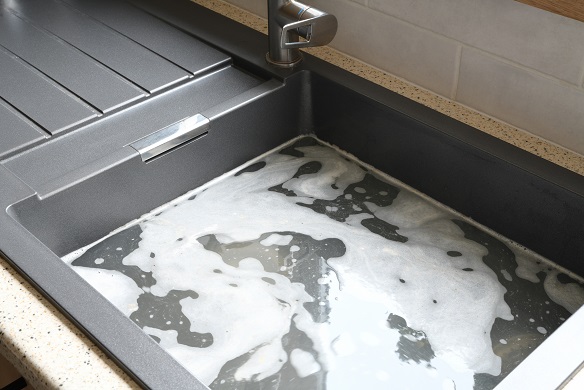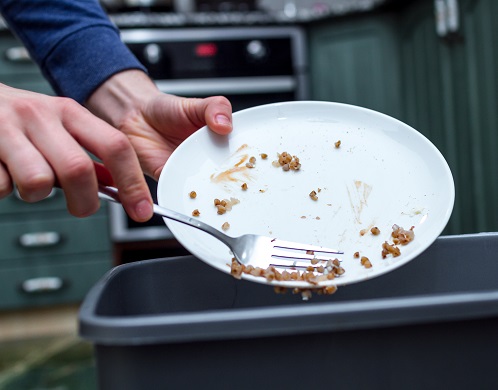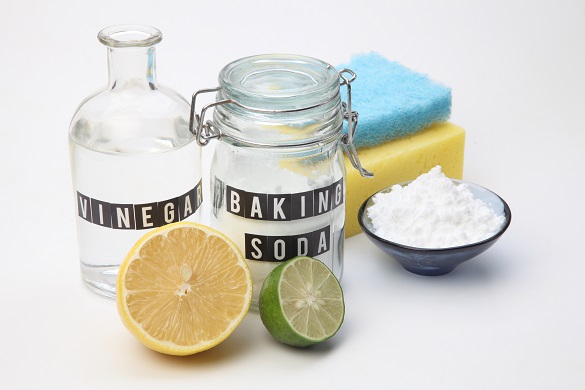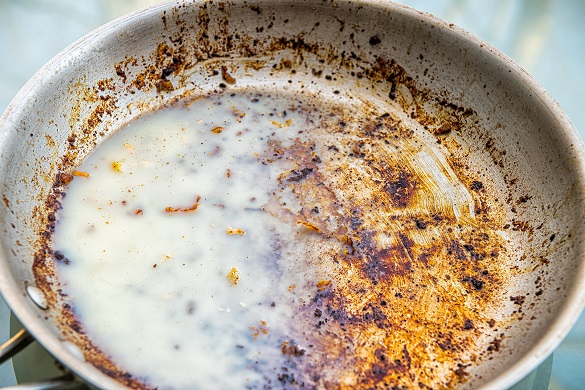If there’s a whiff coming from your kitchen sink, don’t despair – it’s a common problem that’s usually easy to fix. It shouldn’t cost you much either, as you can often deal with the smell using household ingredients.
So let’s look at what causes a smelly kitchen sink and how to keep those bad odours at bay.
Prefer to watch?
What causes kitchen sink smells?
A smelly sink is typically caused by:
- Food or other gunk that’s built up in the waste pipe
- Sewer gases coming up through the U-bend
These aren’t the only possible reasons, but let’s look at the most common ones first.
Does the plug hole smell like rotten eggs?
This distinctive smell comes from sewer gas. The U-bend under the sink is supposed to stop this gas from rising up – so if you can smell something eggy, there’s likely to be a problem in this area. The pipes might be leaking water, leaving space for gas to move upwards. Or the U-bend might be empty if you haven’t used the sink in a long time.
Is water taking a long time to drain away?

It’s probably a blocked waste pipe. And whether it’s food, fat, oil, grease or something else stuck down there, once it starts to rot, your sink will give off some pretty bad smells.
Other causes include:
- A leak or dampness near the sink, which has led to mould
- A build-up of bacteria inside the drain
- A blocked soil vent pipe (this can also affect the other drains in your house, and cause bad smells outside)
How to clean a smelly kitchen sink
If the U-bend is leaking
When you suspect a leaky U-bend, you’ll want to fix that before doing anything else.
This can be as simple as tightening the joints that hold the pipes together. For the usual white plastic pipes, tighten the joints as much as you can by hand (not with a tool). Then, try running the water and see if the leak has stopped. Otherwise, you might need to replace the U-bend or call a plumber to check there isn’t another leak somewhere else.
Get ready to clean
Before you start cleaning, be sure to:
- Put on rubber gloves and eye protection, especially when using chemicals
- Clear the sink and plug hole of any waste or clutter
- Pour boiling water down the plug hole, wait five minutes, then pour cold water after it, to help remove grease
How to unblock it with a plunger

If your sink’s not draining, start with a plunger before trying chemicals. It could save you some money and avoid the need for toxic substances.
First, half-fill the sink with water. If you have two sinks in the kitchen, put a plug in the plug hole that you’re not going to use the plunger on.
Put the plunger cup over the plug hole and push it up and down a few times. Then take it off and see if any water drains down. Keep trying – hopefully some water will go down each time. If it’s working, you can keep going until the blockage is loosened and removed.
How to clean it with chemicals
For a cheaper and less toxic solution, you can try some homemade drain cleaners:
- White vinegar – pour a little down the plug hole, leave it for half an hour, then pour hot water down
- Baking soda and vinegar – put half a cup of baking soda down the plug hole and one cup of white vinegar, leave for a few hours, then flush with boiling water
If a homemade solution doesn’t do the trick, it might be time to try a specialist drain cleaner:
- Bio-enzyme cleaners – these use ‘friendly’ bacteria, rather than toxic chemicals, to break down blockages
- Chemical cleaners – these are strong acids or alkalis, so be sure to protect your skin and eyes when using them
How to prevent your sink from smelling
Once you’ve solved your smelly sink problem, the obvious question is ‘How can I stop it from happening again?’ Thankfully, there are some simple things you can do to keep your sink smelling fresh.
Check out our blog on easy plumbing maintenance to keep the rest of your drains in a great condition.
Don’t put food waste down the sink

Scrape as much food off your plates as you can before washing them in the sink – especially when it comes to stodgy ingredients like pasta or rice, which can stick together and clog the drain. It’s also helpful to fit a strainer plug, which stops food going down the pipes.
Clean the sink regularly

You don’t need to use expensive (toxic) chemicals to look after your sink day to day. Instead, you can use baking soda – a mild alkali that’s pretty cheap to buy. Sprinkle it all over the sink, then rub it with a sponge. Wash it away with white vinegar – and then with water. This should dissolve all the grease and grime, leaving your sink sparkling.
Flush the sink with hot water
Whenever you have hot water left over, get into the habit of pouring it down the sink. While this might sound like a waste of water, it could save you from having to use harmful chemicals on a blockage.
Don’t pour fat or grease into your sink

When oil and fat are warm, they stay liquid. When you leave them to cool down, they go solid. So don’t pour fat, oil or grease down the sink, as it will clump together in the drain. And when the water stops flowing in there, that can cause serious problems.
When to call a professional
Tried all these tips, but still having problems? Then it’s probably time to call a plumber. They’ll have the knowledge and tools to identify the issue and get everything flowing smoothly again.
Once your sink’s back in working order, it might be an idea to take out plumbing and drainage cover. That way, you’ll be protected against unexpected costs if something goes wrong in the future.
Our blog is loaded with more related articles

Plumbing and heating tips
How to unblock your drains
Blocked drains can cause more serious problems if not dealt with in good time. Find out how to unblock your drains and prevent...
Read more

Plumbing and heating tips
Easy plumbing maintenance tips
Did you know that the earliest copper piping dates from an Egyptian pyramid built 4,500 years ago? Since plumbing has been arou...
Read more

Plumbing and heating tips
How to prevent and fix frozen water pipes
Unfortunately, the drop in temperature means you might have another thing to add to your to-do list: sorting out frozen water p...
Read more
